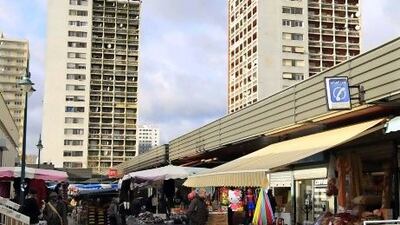MARSEILLE, FRANCE // Qatar's busy programme of global investment has taken a surprising turn, with a pledge to plough millions of euros into small businesses and job creation in disadvantaged districts of France.
The Arabian Gulf state is better known for buying stakes in a range of interests from car making, banking and property to top-class football and glamorous hotels.
Qatar owns the French Ligue 1 club, Paris Saint-Germain, arming it with huge resources designed to build a team that can be champions of France and a major force in European football. Hotel takeovers include prestigious establishments in Paris and on the Riviera.
In its new partnership with the socialist government of the French president, Francois Hollande, and private enterprise, the emirate intends to help some of France's most deprived areas.
Although attention has focused on the benefits for the banlieues - where a largely immigrant population lives in intimidating blocks of low-cost flats on the fringes of Paris and other French cities - officials insist that "abandoned" rural areas will also receive help.
Details of the initiative emerged as France braced itself for unemployment figures, released yesterday, that showed three million people out of work, more if overseas territories are included.
Ministers are anxious to discourage the controversial notion that lavish funds from a Muslim country will be directed towards poor districts where most residents are followers of Islam.
However, despite gradual tinkering with a project first mooted a year ago, near the end of the presidency of Nicolas Sarkozy, critics have not been silenced by the cautious approach of the government and Qatari diplomats.
Marine Le Pen, the leader of the far-right, anti-immigration Front National, denounced the plan as amounting to a "Trojan horse of Islam". Qatar's interest in the banlieues, she said, was "obviously related to the overwhelmingly Muslim religion of the inhabitants".
If her harsh assessment was predictable, the response of Mr Hollande's more mainstream opponents has hardly been enthusiastic.
Lionnel Luca, a member of parliament for Mr Sarkozy's Union for a Popular Movement (UMP), called for a commission of inquiry into Qatar's increasing presence in French commercial and social life.
In a letter to Claude Bartolone, the president of the national assembly, he said there would be no concern if foreign support came from a "secular democracy" or even a "non-proselytising religious state".
But, he claimed, Qatar "practises a fundamentalist Islam" and sought to encourage it "everywhere in the world, which arouses some anxiety about the real nature of its investments in our country".
There is uncertainty about the extent of Qatar's proposed commitment. Initial media reports talked about €100 million (Dh472m), half of it from public and private French sources. But Fleur Pellerin, the minister for digital economy, said the total amount to be pumped into regenerating such areas would be 10 times higher.
The ministry for industrial recovery gave no figures but said: "It will be a Franco-Qatari fund, as there is a Franco-Chinese fund or Franco-UAE fund. This mix goes beyond the presence of two states, the idea being that the French contribution also includes private funds."
Officials at the Qatari Embassy in Paris did not comment. A London public relations consultancy that deals with the European activities of the Qatari sovereign wealth fund said it had no information.
One Qatari with knowledge of the effort confirmed only that the intention was to collaborate with the French authorities in encouraging the development of small and medium-sized businesses - those employing fewer than 250 people.
The creation of such enterprises would bring a significant boost to the poorer suburbs.
In France's second city, Marseille, a mayor said recently that drug-trafficking was the principal source of employment on some estates.
The left-leaning daily newspaper Le Monde said the project had undergone a series of refinements designed to disarm critics. Mr Hollande met the Qatari prime minister, Hamad bin Jassem Qatari Al Thani, in June. The French industrial recovery minister, Arnaud Montebourg, was said to have had "discreet" talks with the emir, Sheikh Hamad bin Khalifa Al Thani.
But the fund's origins can be traced to a visit to Doha last year by members of Aneld, a French association of local politicians chiefly from the Maghrebi community. Aneld was reportedly furious at the idea of helping business as opposed to community projects, complaining about a "misappropriation of funds" by the new government.
Mr Montebourg has since met the association and is believed to have offered assurances about the way the money will be spent.
In areas that could benefit, many undoubtedly see help from the Middle East - or anywhere - as a boon.
Mohamed Khemliche, 43, struggling to establish a business repairing lifts, said that if Qatar was ready to finance small enterprise, "so much the better".
"It's difficult to obtain finance just now," he said in the Seine-Saint-Denis department on the northern outskirts of Paris. "The banks are not lending. So it offers an opportunity if the Qataris come here with funds. We'd want to benefit from it … I don't think they'd invest in businesses if there was not some obvious competence."
* Additional reporting by Reuters


